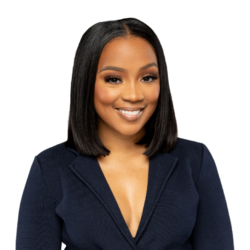I ♡ Trademarks Conference 2025Under the Influencer: Avoiding Chaos for NIL on Social Media
Alt Legal Team | January 27, 2025
At the Alt Legal I ♡ Trademarks Conference on March 18, 2025, Erica Rogers (Ward and Smith) moderated a discussion between Shelley Fullwood (Olive and Olive), Kyona McGhee (Trademark My Stuff), and Michelle Miller (Chicago-Kent College of Law, Illinois Institute of Technology), “Under the Influencer: Avoiding Chaos for NIL on Social Media.” Download the presentation materials here. Here are some key takeaways from the session:
- Kyonna – I’m having issues where a client paid an influencer $20k to promote their brand and the influencer failed to do what was expected. The brand wants to maintain the relationship with the influencer, but they need the influencer to do their part of the contract. A lot of influencers aren’t taking their jobs seriously and they aren’t represented by counsel. It’s difficult to navigate, so when entering into agreements with influencers on social media, you need proper contracts – set expectations and deadlines. Also, be sure to get full contact information from the start so you aren’t chasing the influencer with just their social media handle if there’s an issue.
- Kyonna – When influencers are asked to speak at events, I’m seeing that often the event host wants the rights to resell and monetize the event so they work it into the contract. When you’re representing the influencer, you need to push back and say that the host cannot repackage or sell the content. Most of the time, the host will oblige and if they don’t, I advise the client not to get involved. Influencers are really cornering in on their talent.
- Kyonna – Help your clients to ensure they aren’t entering into exclusive relationships and make sure that they understand their obligations. They may be obligated not to promote other brands and competitors, hang out with other influencers, etc.
- Shelly – It’s important to ensure that your social media clients are understanding FTC provisions in contracts. I want to be sure you aren’t getting in trouble for not putting up proper notices that you have a relationship with a company and that they are paying you for your content. Make sure that the contracts say that the influencer if responsible for that responsibility and that they will comply with FTC requirements.
- Kyonna – Our firm made a quick FTC cheat sheet to send to clients – this is a great way to contact clients with helpful information and to nourish that relationship. That way you aren’t always contacting them about invoices or to sell something.
- Kyonna – Be sure that contracts do not lock your client in. One of my favorite clients had an exclusive online sales deal with Target, but my client wanted to pull out after Target’s announcement that it would be rolling back DEI initiatives. My client didn’t want to tarnish the relationship, so we had to work creatively, using my very best writing skills (and ChatGPT) to help navigate this unexpected situation
- Shelly – When engaging with a brand, make sure that your clients understand that their likeness is going to be manipulated and that they will lose part of their likeness. Make sure you determine how your client is going to feel about that because they lose control when an artwork is based off of them. For example, Michael Jordan’s silhouette was altered to become a trademark. Michael might think this is the silliest position and that he would never pose like that, but we think it’s pretty cool. You do lose control in these situations and you never know how big something is going to become.
- Takedown Requests: Michelle – I’ve had situations where someone was using the exact same brand name as my client and if people won’t move expeditiously, I will use take down requests. In particular, I’ve had success with YouTube. I will try to contact the person posting the content first, and in most instances, that works, but if they won’t do it or are too slow, then I will go the takedown route. Shelly – I see a lot of scam shops happening with low-level influencers and small businesses. On Facebook and Instagram, if you have trademark protection, you can report these scam shops for violating trademarks. But you can’t report them for creating another profile that looks like yours – that avenue is less successful. If you report trademark infringement to the Facebook/Instagram IP Center, you will get a response because the platform may become contributorily liable if they don’t respond to your request.
- Erica – A lot of clients want to trademark their name, but that gets them a failure to function refusal – their name is simply the source, not trademark use. It’s important to help explain this distinction to clients.
- Erica – As far as protecting “vibes” and “aesthetics” the “sad beige” case will be informative. For these clients, I take a copyright angle. Interior designers are decorating spaces and using those spaces to advertise their services. They should photograph their spaces, register those photos, and have them on their website. If someone is posting something very similar, perhaps you can’t use the arrangement of furniture as a source identifier, but if the furniture arrangement in someone’s photos is substantially similar enough, it could constitute copyright infringement. But the difficulty here is the limitation of copyright law. It will be very interesting to see if NIL can capture the rights of an overall aesthetic and vibe.
- Michelle – My NIL clients in the entertainment industry are saying they want to own their names. They are entering situations where typically the TV or music company would own the name but now the clients are pushing back. They are telling the networks and companies that if they created the name for the show, they want to own the name so that they have the ability to use it for their own merchandise. I’m seeing clients get pushback from networks and music companies because this hasn’t been part of contracts before. But now my clients have specific language to add to contracts. I believe there will be a growing context where we will see more of this.
- Michelle – The NIL discussion is particularly important when it comes to AI and deepfakes. Clients want to understand if they grant a license, will the licensee have the ability to create meta version or does the client maintain rights to do that?
- Structure of NIL Agreements: Kyonna – The majority of contracts I’m seeing are flat rates when it comes to posts, reels, series, photoshoot, etc. Michelle – I do see flat fees but make sure that a creator of show gets a fee especially if they are giving up their IP rights. Also, be sure that the fee is negotiated. Additionally, you want to be sure that your client is getting paid for all the pieces of the puzzle that they bring to the table, that they won’t lose money or opportunities in the future. Your goal is to negotiate for ongoing fees. Make sure your client is getting paid if they bring talent to the show, or if they are executive producers for the show, etc. Also, be sure to negotiate and carve out IP rights for ongoing revenue for your client. Entertainers are entrepreneurs and you want your clients to be able to use IP to produce ongoing revenue for themselves. Try to find creative ways to get this done.
- Michelle – Attorneys can help their clients who enter into contracts understand that the contract doesn’t control every aspect of their life, nor does it control all interactions with other people. Make sure that your clients enter into agreements with reasonable expectations so that clients don’t feel boxed into a corner. For example, if the client is out with friends and those friends are wearing different brands, the client won’t be in trouble with their brand. Be sure that they enter into a brand deal, not a “life deal” so that your client can enjoy life and not be controlled by a contract simply because they are in a brand deal.
Speakers
Erica Rogers , Attorney, Ward and Smith
, Attorney, Ward and Smith
Erica is a North Carolina State Bar Board Certified Specialist in Trademark Law. She assists individuals, small businesses, and large corporations with a wide array of intellectual property matters. She understands the personal, financial, and meaningful effort clients invest in their intellectual property, and her background and work reflect this understanding. While not practicing law, you’ll find her immersed in music – whether at the piano, discussing technological advances to the consumption of music, enjoying friends performing at live events, or listening to tunes while running long distances (albeit slowly). She shares her home with her wife, three cats, and a Great Pyrenees puppy named Juno!
Shelley Fullwood , Attorney, Olive & Olive
, Attorney, Olive & Olive
Shelley B. Fullwood is a graduate of the University of North Carolina at Chapel Hill and of the North Carolina Central University School of Law. She not only studied at North Carolina Central University’s School of Law but also served on its faculty. Prior to joining Olive & Olive, she served as the NCCU Intellectual Property Law Institute’s Trademark and Copyright Fellow and also as Supervising Attorney for the Trademark Clinic within the NCCU IP Clinic where she trained and supervised student practitioners in the area of United States trademark prosecution, and advised clients on intellectual property issues for media and online content, including social media platforms. She also was a frequent speaker on the Institute’s programs on issues related to intellectual property law and at other programs around the area. At Olive & Olive, Shelley focuses on copyright and trademark protection, and on intellectual property agreements. She has been involved in identifying and protecting trademark rights for multiple university and academic clients, and assists clients in discerning the nature and scope of their protectable properties and how best to choose among the alternatives available to maximize their protection. She assists clients in protecting and monetizing their artwork, social media, web content, brands, and a wide range of other properties; and is skillful in negotiating the ever-changing rules and regulations of the United States copyright and trademark offices, staying abreast of new technologies and their impact on protection. She is an active participant in the NC arts scene, a volunteer for NC Lawyers 4 Literacy, an Ambassador for the Greater Durham Chamber of Commerce, and an amateur aerial hoop artist.
 Kyona McGhee, Founder, The McGhee Law Firm
Kyona McGhee, Founder, The McGhee Law Firm
Kyona is the founder of The McGhee Law Firm, PLLC better known as “Trademark My Stuff”. As a mother of three children and a wife, she graduated as valedictorian of her law school class in May 2018. Prior to graduation, she was already being recognized for her expertise and skill. Kyona was selected to be the teaching assistant while in law school for The Law of Evidence and Professional Ethics and Responsibility courses. She was also named by Ms. JD as a “Woman of the Law” at an event at Harvard Law School in the fall of 2017. Lastly, she is regarded as a leader in the small business community, having been named “Minority Small business Owner of the Year,” by the Flint and Genesee Chamber of Commerce in 2015. Since founding this firm, Kyona has successfully filed thousands of trademark applications, and held the hands of hundreds of entrepreneurs as they navigate the demands of growing a new business. Kyona now leads a legal team of seven phenomenal women and men helping push the mission of this firm forward every day. She has been recognized by the American Bar Association, Yahoo, Law Practice Today, NewsNation, and countless other national media outlets.
Michelle J. Miller , Attorney and Assistant Clinical Professor, Chicago-Kent College of Law
, Attorney and Assistant Clinical Professor, Chicago-Kent College of Law
Michelle J. Miller is a highly accomplished international business, trademark, and entertainment attorney.. With over two decades of legal experience, Michelle has carved out a unique space in the legal field, serving an array of high-profile clients, from celebrities and entrepreneurs to global corporations. After spending the majority of her legal career in an in-house counsel position, in 2018 Michelle decided to reinvent her professional legal profile by exiting the corporate world and starting her law practice in 2019. Michelle’s journey has been defined by resilience and an unwavering passion for success. She earned two law degrees while balancing life as a single mother, demonstrating her determination and dedication to both her family and her career. She holds a Bachelor of Arts Degree (BA) from the University of Illinois at Urbana-Champagne, a Juris Doctor (JD) from DePaul University College of Law, and a Master of Laws (LL.M) from the University of Illinois Chicago School of Law. In 2022, she further enhanced her expertise by obtaining a Certification in Financial Analysis and Valuation for Lawyers from Harvard Business School Online/Harvard Law School adding depth to her approach to business law. Beyond her extensive legal practice, Michelle established the Intellectual Property, Entertainment, & Entrepreneurship Clinic at Chicago-Kent Law School. The clinic is unique in that it is connected to Kent’s in-house law firm. Michelle leads this law clinic and in-house practice. As a professor, she is committed to shaping the future of legal professionals by blending her hands-on experience with academic leadership. Michelle’s love for international speaking, education, business, and intellectual property law has taken her around the world including China, South Africa, Dubai, Singapore, Tanzania, Azerbaijan, Indonesia, and other nations, Michelle has worked with clients and businesses in a variety of industries, offering global legal strategies that meet the highest standards of excellence.